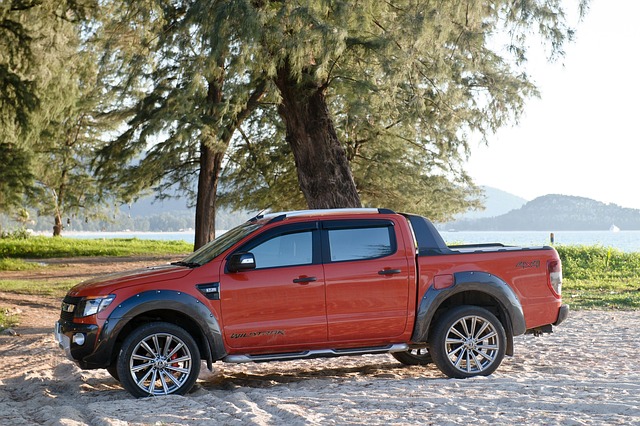Looking to register your car in California? This guide walks you through the entire process, from understanding eligibility requirements to post-registration steps. First, ensure your vehicle meets state standards by gathering essential documents for a DMV VIN verification. Prepare your vehicle for inspection and title transfer before visiting a local DMV office. We’ll also cover key considerations after registration.
- Understand Eligibility Requirements for Car Registration in California
- Gather Necessary Documents for DMV VIN Verification
- Prepare Your Vehicle for Inspection and Title Transfer
- Visit a California DMV Office for Registration and VIN Verification
- Post-Registration Steps and Important Considerations
Understand Eligibility Requirements for Car Registration in California

Before diving into the registration process, it’s crucial to understand the eligibility requirements for car registration in California. To register your vehicle, you must first ensure that your car meets all state and local standards for safety and emissions. The Department of Motor Vehicles (DMV) conducts a thorough vin verification process, checking the vehicle identification number (VIN) to confirm its authenticity and history. This includes verifying the VIN with national databases to ensure it hasn’t been reported stolen or has any outstanding legal issues.
Additionally, your car must be insured for liability coverage, as per California state law. You’ll also need to obtain a registration card and license plate from the DMV after passing the necessary inspections, which may include a smog test depending on your vehicle’s age and emissions standards. Using a mobile vin verifier or undergoing a mobile vin inspection can streamline this process by providing immediate results and ensuring you meet all eligibility requirements before initiating the registration.
Gather Necessary Documents for DMV VIN Verification

Before heading to the California DMV, make sure you have all the required documents for a smooth VIN verification process. This includes your vehicle’s registration certificate or proof of ownership, along with valid identification documents such as a driver’s license or passport. Additionally, take note of any previous insurance records or proof of liability coverage.
Gathering these essential papers is crucial for a successful DMV visit. You may also consider having a mobile vin inspection done if you prefer a more convenient option, where a professional can perform the VIN verification on your behalf. Alternatively, some services offer remote or online vin inspection to save you a trip to the DMV. Ensure that any service you choose is reputable and approved by the California DMV to avoid any potential issues.
Prepare Your Vehicle for Inspection and Title Transfer

Before you can register your vehicle in California, it’s crucial to ensure your car is ready for inspection. This involves preparing all necessary documents and ensuring your vehicle meets state safety standards. One critical step is to obtain a valid Vehicle Identification Number (VIN) inspection, which can be facilitated by a mobile VIN verifier or through the DMV’s services. The Department of Motor Vehicles (DMV) in California conducts a VIN verification process to confirm the authenticity of your car’s identification number and ensure it matches the vehicle’s characteristics.
During this preparation, double-check that your title is ready for transfer. Ensure all previous owners’ signatures are present and that the title is free from any liens or encumbrances. A clean title simplifies the registration process significantly. Properly documenting these steps ensures a smoother experience when you bring your vehicle to the DMV for inspection and registration.
Visit a California DMV Office for Registration and VIN Verification

To register your car in California, a visit to a DMV office is an essential step. Here, you’ll undergo a critical process known as DMV vin verification, where the unique identifier on your vehicle, the Vehicle Identification Number (VIN), is checked against state records. This ensures the authenticity and legality of your car’s registration. The staff will verify that all documents are in order and that your vehicle meets California’s safety standards.
This step is often considered a crucial part of the registration process, especially when using mobile vin verification services or relying on a mobile vin verifier. These digital tools can expedite the inspection by comparing your VIN against national databases, but physically visiting a DMV office provides an extra layer of assurance and allows you to complete the registration for your California vehicle seamlessly.
Post-Registration Steps and Important Considerations

After successfully registering your vehicle in California, there are several crucial post-registration steps to complete. One essential task is to obtain a Vehicle Identification Number (VIN) verification from the DMV. This process ensures that your car’s VIN is accurate and matches the vehicle described in the registration records. It’s an important step, especially when purchasing a used car, as it helps prevent fraud and ensures you’re aware of any potential issues.
Additionally, considering a mobile vin verifier or conducting a mobile vin inspection can offer convenience and peace of mind. These services allow you to verify your vehicle’s history quickly and easily from the comfort of your home or garage. With a simple online search or app download, you can access detailed vehicle information, including accident reports, maintenance records, and previous owners, providing valuable insights into your car’s past and helping you make informed decisions moving forward.
Registering a car in California involves understanding eligibility requirements, gathering essential documents, preparing your vehicle, and visiting a DMV office for VIN verification. Once registered, complete post-registration steps for full legal compliance. Remember that proper documentation and vehicle conditions are crucial for a seamless process, ensuring you’re up to date with all regulations, including dmv vin verification.
